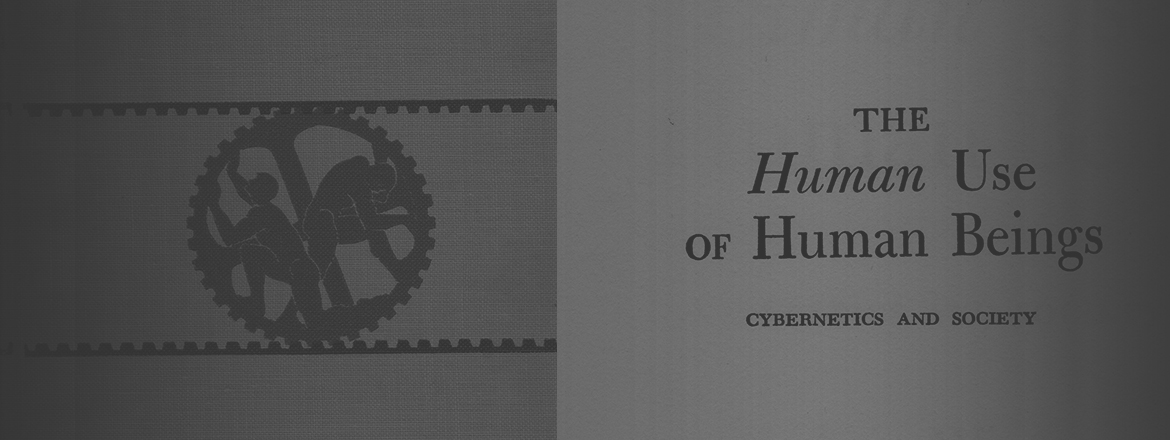

CONFERENCE KEYNOTE
The title of Norbert Wiener’s second book is widely misquoted. As was clear in the typesetting of his original title page, he was concerned about “The Human Use of Human Beings” — Wiener’s emphasis on the first “Human” is generally forgotten. His purpose is reinforced by his subtitle, “Cybernetics and Society”, for social contexts are where human beings can conserve or devalue their own human-ness.
This presentation explores specific ways in which humanity is not treating itself so well in our 21st-century era, especially in regard to digital technology, much as Wiener feared when writing in1950. His warnings of de-humanizing automation at the hands of digital machines were prescient, as we now live in the world he feared. We have seen that our “know-how” about digital machines has supplanted the “know-what” — again in Wiener’s phrasing — because as a society we bolt ahead before considering “what our purpose to be.”
Wiener was joined by others in initiating the field of Cybernetics. McCulloch and Mead and von Foerster, gathering a wide array of experts across all the academic disciplines, cut a wide and influential swath with their Macy Conferences. By combining this legacy of Cybernetics with the inspiration that a revival and revision of the Macy Meetings can bring, we chart a fresh course for addressing the tyrannies of today’s digital tech. Cybernetic concepts give foundation and cybernetic practice guides our actions toward a future more coherent and humane than the one we have today.
This presentation offers actionable paths forward that are restorative of Wiener’s values. As he wrote, “The hour is very late, and the choice of good or evil knocks at our door.”
DownloadPosition Paper on #NewMacy: Responding to the Pandemic of "Today's AI"
DownloadPPDF of #NewMacy-related Appendices
DownloadAndrew Pickering's call for "Next Macy Meetings"
DownloadCybernetics and Design: Conversations for Action, co-authored with Hugh Dubberly
DownloadBlog Post on #NewMacyMeetings
DownloadLess Interference, More Dance!: Interpreting Gordon Pask, Toronto 2019
DownloadConversation is the Heart of Interaction, IXDA PGH, 2018
DownloadLinks about Designing for Conversation
ViewPangaro's RSD5 Video on Vimeo
Paul Pangaro is President of the American Society for Cybernetics and Professor of the Practice in the Human-Computer Interaction Institute at Carnegie Mellon University. A current project is an initiative called #NewMacy that will revive and revise the original Macy Meetings for the challenges of the 21st century. His career spans startups, consulting, research, and education. He has worked with and within startups in New York and Silicon Valley, in product and technology roles. His most recent startup was General Cybernetics, dedicated to new ways of reading and writing in digital media based on Gordon Pask’s Conversation Theory. His consulting clients include Du Pont, Nokia, Samsung, Instituto Itaú Cultural (São Paulo), Ogilvy & Mather, Intellectual Ventures, and PoetryFoundation.org. He has lectured in São Paulo, Paris, Berlin, Vienna, Linz, and in cities in the US, most often on design for conversation and conversations for design. Partnering with TJ McLeish as master fabricator, they created a full-scale replica of Pask’s Colloquy of Mobiles, displayed at Centre Pompidou in Paris in 2020 and now part of the permanent collection at ZKM in Germany. Pangaro studied theatre, film criticism, and computer science while earning a B.S. at MIT, spending the rest of his time acting in plays and writing software for interactive graphics and computer-generated film. On graduating Pangaro worked on neural simulations with Jerry Lettvin and then joined the research staff of the MIT Architecture Machine Group where he met Gordon Pask and consequently completed his PhD with Pask at Brunel University (UK). His work can be found at http://pangaro.com/.